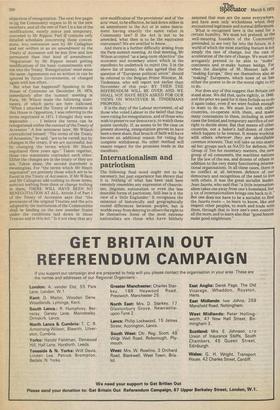Internationalism and patriotism
The following final word ought not to he necessary, but past experience has shown that it is. Nothing of what has been said here remotely resembles any expression of chauvinism, jingoism, nationalism or even the less desirable forms of patriotism. Still less is it the view of a 'little Englander.' It recognises the existence of historically and geographically rooted differences between peoples, but is worlds away from denying to others the right to be themselves. Some of the most extreme nationalists are those who have blithely assumed that men are the same everywhere, and have seen only wickedness when they encountered legitimate and normal differences.
What is recognised here is the need for a certain humility. We must not pretend, as the well-meaning founders of the Community pretended, to see very far into the future, in a world of which the most startling feature is not simply the rate of change, but the rate of acceleration of the rate of change. We must not arrogantly pretend to be able to "make" continents and re-make human beings. For when the disciples of M. Monnet talk of "making Europe," they see themselves also as "making" Europeans, which none of us has either the power to do or the moral right to try to do.
Nor does any of this suggest that Britain can stand alone. We did that, quite rightly, in 1940, and the price we paid for it then forbids us to do it again today, even if we were foolish enough to want to do so. We must live with other countries, co-operate with them, and make many concessions to them, including in some cases the limited and temporary sacrifice of our right to decide alone. But that means all other countries, not a baker's half-dozen of those which happen to be nearest. It means working with others wherever they are identifiable common interests. That will take us into many ad hoc groups such as NATO for defence, the Group of Ten for monetary matters, the new group of oil consumers, the maritime nations for the law of the sea, and dozens of others in addition to the very many functioning international organisations. In all these cases, there is no conflict at all between defence of our 'democracy and recognition of the need to live with others. It was the great socialist leader, Jean Jaures, who said that "a little internationalism takes one away from one's homeland, but a lot of internationalism brings one back to it." But one does not have to be a socialist to find the Jaures route — to learn to know, like and respect other peoples, to work and trade with them, through that to love one's own country all the more, and to learn also that "good fences make good neighbours."










































 Previous page
Previous page